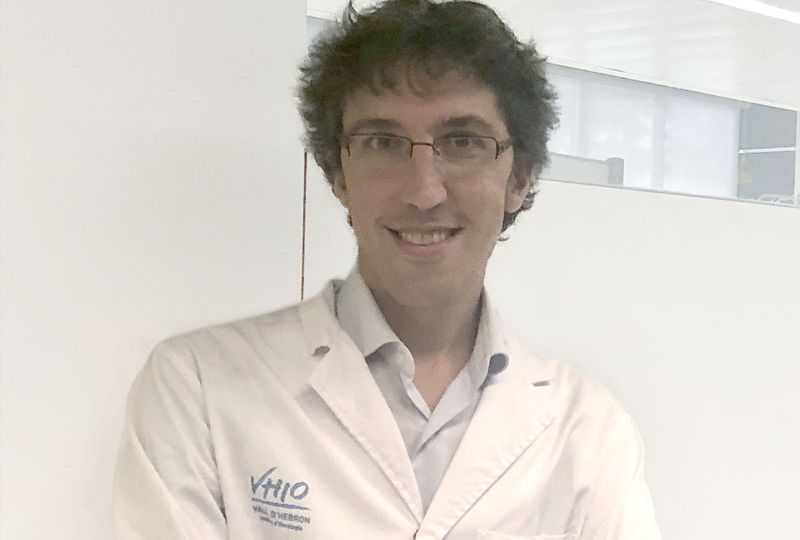
- Launched: first international clinical trial with CAR T cell therapy for patients with aggressive B-cell non-Hodgkin lymphoma (B-Cell NHL) in Europe
- The trial has been designed to determine the efficacy and safety of JCAR017, a chimeric antigen receptor (CAR) T cell therapy, in the treatment of clinically selected adult patients with relapsed or refractory disease
- VHIO is the first site in Spain to conduct a trial with this immunotherapy for this particular patient population
- Among the 16 selected sites across Europe, VHIO is also the first to have been granted authorization for patient enrolment
Novel chimeric antigen receptor (CAR) T cell therapy is a rapidly emerging immunotherapy-based approach involving the removal of immune cells from a patient and turbocharging them with new proteins that empower them to recognize and hone in on cancer. The cells are then returned to the patient in large numbers to mount an antitumor attack.
The first CAR T-focused multi-center clinical study for patients with a highly aggressive form of type of blood cancer, B-cell non-Hodgkin lymphoma (B-Cell NHL) – the TRANSCEND World trial, has opened at VHIO. Pere Barba, Clinical Investigator and Hematologist of VHIO’s Experimental Hematology Group, headed by Francesc Bosch, is Principal Investigator of the study at VHIO.
Commenting for VHIO Communications Pere Barba said, “As a reflection of VHIO’s renowned expertise in accelerating and advancing immunotherapies against cancer, we are the only site in Spain to have been selected to conduct this study aimed at significantly improving outcomes for our patients with relapsed or refractory disease”.
Designed to determine both the efficacy and safety of novel therapy JCAR017, CD19-targeted Chimeric Antigen Receptor (CAR) T Cells, this two-year phase II single-arm and multi-cohort study powered by Celgene, will run across 16 sites spanning 10 European countries as well as an additional two in Japan and seeks to validate the promising response rates and superior safety profile of this treatment observed in earlier phase trials.
The trial sites were identified based on established clinical research of excellence coupled with grounded experience in carrying out studies involving the administration of complex anti-cancer therapies that can be associated with adverse side effects in some patients. In VHIO’s case, one major strength lies in our purely translational and multidisciplinary research model along with our privileged location within the Vall d´Hebron Barcelona Hospital Campus, affording our investigators direct access to patients as well as the entire spectrum of oncology professionals who care for them.

More specifically, in view of some risks associated with receiving CAR T cells, specialist faculty members of the Vall d´Hebron University Hospital’s (HUVH) Hematology Department including Pere Barba, also directed by Francesc Bosch, have the essential expertise to best manage the potential side effects. This Department will also be responsible for recruiting the clinically selected patients and administering therapy at its Hematology Transplant Unit.
By ultimately evidencing both the efficacy and safety of CAR T cell therapy in patients with diffuse large B-cell lymphoma -one of the most common subtypes of lymphoma accounting for approximately 30% of all cases- this approach could open up a much needed, alternative therapeutic avenue. Conventional treatment for these patients typically combines immunochemotherapy with chemotherapeutics plus monoclonal antibodies. In some cases however, these strategies do not unfortunately work and either autologous (from the same patient) or allogeneic (from a compatible donor) bone marrow stem cell transplantation is performed.
Some of these patients with advanced disease will not respond to this approach and are thus referred to as relapsed or refractory cases. “These are usually patients with highly aggressive lymphomas. As non-responders, they might be suitable candidates to receive CAR T cell therapy. We envisage that as this study evolves, 25% of patients with aggressive diffuse large B-cell lymphoma could ultimately benefit,” observed Pere Barba, who is leading the trial at VHIO.
CAR T cell therapy, while complex, promises greater efficacy and a superior safety profile compared to other approaches in treating lymphomas that are resistant to conventional therapies. He continued, “Despite the fact there is still no long-term data, previous results from earlier phases of this trial and data from US-based studies report a response rate in more than half of the patients included and 40% seem to be in continuous remission, showing great promise compared with current treatments”.
“With two CAR T cell therapies having already been approved by the US Food and Drug Administration for the treatment of acute lymphoblastic leukemia and non-Hodgkin lymphoma, we are confident that we will ultimately be able to improve outcomes for these patients for whom there are currently very limited therapeutic options,” concluded Pere.
To discover more about this study as well as VHIO’s portfolio of early phase immunotherapy clinical studies please contact Amanda Wren, Director of Communications, Vall d´Hebron Institute of Oncology (VHIO): awren@vhio.net.
###








